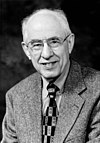Hilary Whitehall Putnam (born July 31, 1926) is an American philosopher who has been a central figure in Western philosophy since the 1960s, especially in philosophy of mind, philosophy of language, and philosophy of science. He is known for his willingness to apply an equal degree of scrutiny to his own philosophical positions as to those of others, subjecting each position to rigorous analysis until he exposes its flaws. As a result, he has acquired a reputation for frequently changing his own position.
In philosophy of mind, Putnam is known for his argument against the type-identity of mental and physical states based on his hypothesis of the multiple realizability of the mental, and for the concept of functionalism, an influential theory regarding the mind-body problem. In philosophy of language, along with Saul Kripke and others, he developed the causal theory of reference, and formulated an original theory of meaning, inventing the notion of semantic externalism based on a famous thought experiment called Twin Earth.
